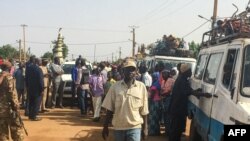The investigation by the U.N. High Commissioner for Human Rights, unveiled Friday, describes in graphic detail how hundreds of people in the central Malian town of Moura in March 2022 were rounded up and shot dead.
The death toll given by the report makes the atrocity the single worst in the Sahel country since a jihadist insurgency broke out in 2012.
Around 20 women and seven children were among those killed, while evidence suggests 58 women and girls were victims of rape and other forms of sexual violence, the report said.
The Burkina Faso government said it was "surprised by the content of the report" and called its conclusion "incomprehensible."
Burkina "expresses its solidarity with the government and brotherly people of Mali, as well as with all of the forces fighting in the struggle against the forces of evil and unjustly taken to task for alleged violations of human rights," communications minister Jean Emmanuel Ouedraogo said in a statement.
Both Burkina Faso and Mali are run by military juntas which seized power amid mounting anger with elected leaders over failures to roll back a brutal jihadist insurgency.
Both countries have severed military ties with France, the traditional ally of countries in the Sahel, and Mali has brought in Russian mercenaries to support its military.
Mali's junta on Saturday described the report as "fictitious" and "biased" and insisted that the only people killed were "terrorist fighters."
The U.N. report did not name the foreigners, but the United States has placed the blame with Russia's Wagner mercenary group.
State Department spokesman Matthew Miller said Monday that Wagner was "a destabilizing force whose personnel have engaged in an ongoing pattern of abuses, including execution-style killings, sexual violence, and torture in Mali and other nations struggling with instability."
